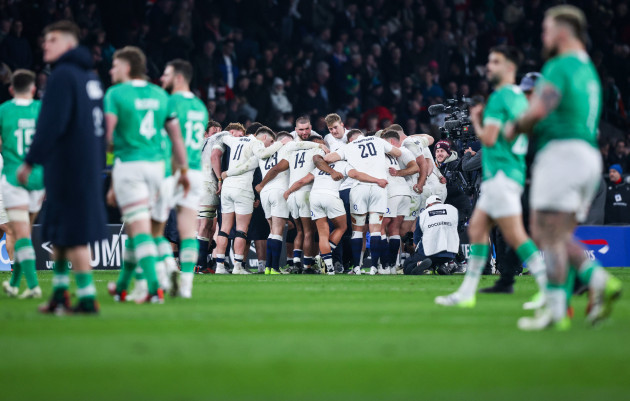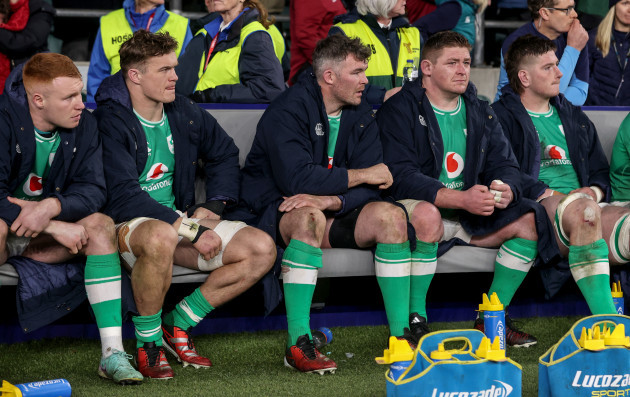IF YOU’D SENT a randomer into the post-match press conference at Twickenham on Saturday and asked them to tell you whether Andy Farrell’s team had won or lost based on his body language, they’d surely have guessed the former.
Farrell tends not to be overly excited when Ireland have won, which is more often than not, so it makes sense that he shouldn’t be too despondent when they lose. This is how he tends to handle situations in which others’ emotions can run high.
He was phlegmatic about the 23-22 loss to England and went as far as to say “it would have been unjust if England hadn’t won the game.” Farrell was in no doubt that Steve Borthwick’s side deserved the victory and surely no one could disagree with him.
But evidently, Farrell felt it was important to be positive because while Saturday was the end of one goal, it wasn’t an end point for another major one. The Grand Slam is gone but a Six Nations title is still there for Ireland.
If Farrell’s men record a win of any kind over Scotland this Saturday in Dublin, they will be crowned champions for the second year in a row. A draw would also guarantee them the title, as would a losing bonus point combined with a try-scoring bonus point.
In fact, Ireland could even be crowned Six Nations champions if they got no match points against Scotland but other results went their way. Yet the job is clear as Gregor Townsend’s side visit the Aviva Stadium – get back to winning ways and finish this championship on a high.
Farrell has no worries that there could be any anti-climatic feeling in the Aviva Stadium.
“How many times have we won the Six Nations?” said Farrell, probably knowing that the answer is five.
“Everyone would love to be in our position. We’ve got to make sure we are loving that challenge as well.”
You wondered whether his players were feeling the same way. In the immediate aftermath, probably not. But it’s literally Farrell’s job to make sure they don’t wallow in disappointment. Ireland are back to work today, preparing to take on the Scots.
And Farrell reckons Irish fans won’t have any problem rising to the occasion this Saturday either.
“I have absolutely no doubt that they will be 100% on song,” said the Ireland boss. “Paddy’s weekend again, a chance to win a Six Nations, it doesn’t get… well, it could have been a little better but these things, Grand Slams are unbelievably hard to come by, Six Nations are hard enough, as anyone would vouch for.”
He’s right there. The last time Ireland won back-to-back Six Nations titles was 2014 and 2015, neither of which were Slams. Securing this year’s championship would leave Ireland on six titles in the Six Nations era, which began in 2000. England lead the way with seven, while France and Wales are on six. Scotland and Italy have won none.
The fact that Farrell’s Ireland team has won so many games in recent years has raised expectations to lofty heights, to the extent that not securing the Grand Slam is seen as a big failure in some quarters.
There’s also the fact that Ireland’s last two championship wins in 2023 and 2018 were Grand Slams. It’s nearly a decade since the last ‘normal’ Six Nations triumph, so they have become somewhat unfamiliar.
But it really isn’t long since Ireland were doing laps of honour to celebrate winning Triple Crowns because they were such an improvement on the Wooden Spoons that older Irish fans remember well.
Of course, a major part of the process of getting over the defeat to England will be today’s review in Ireland camp. Farrell can pick out some good things like the two tries his team scored but there was plenty of footage to go in the folder marked ‘Learnings.’
Ireland’s defence gave up eight linebreaks and three tries, as well as lots of gainline to the punchy English ball-carriers. There were a couple of crucial lineout losses and uncharacteristic handling errors in the English half at key moments.
Ireland struggled to exit well from their own 22 and there was a general lack of composure and accuracy in the second half.
“The message at half time was how to improve our territory and possession battle, to be aware of our surroundings a little bit more,” said Farrell, who felt his team lacked discipline in how Ireland hoped to play the game.
“I thought we became a little bit too desperate to try and solve things on our own, whether it be decision-making at the breakdown or looking at your surroundings at the breakdown – are you offside or not, what have you got on the outside of you defensively, what’s the system we need to communicate to each other?
“It was a little bit disjointed as far as that’s concerned and that’s what gave them the access.”
Farrell and his coaches must put a self-critical lens on things too. What messages were going onto the pitch in the endgame after Ireland had edged in front after James Lowe\s second try? Were the right tactical instructions conveyed?
“It’s not just that, it accumulates to the reason why you’re either two points up or any other type of scenario,” said Farrell when asked how he felt Ireland handled the closing stages.
“I thought we could have kicked longer and out, the other one was out and a little bit short and those are the small bits that matter in the end.”
Could Ireland have used their six bench forwards earlier than the 61st minute given that they were lacking a bit of zip?
For the first time in a while, Ireland’s bench didn’t make a major impact on the game, even taking into account the early injury for Calvin Nash immediately putting their 6/2 split under pressure. His replacement, Ciarán Frawley, was then forced off with half an hour to go, meaning scrum-half Jamison Gibson-Park had to go to the wing.
“You’re damned if you do… it’s the best thing since sliced bread when it goes well for you, isn’t it?” said Farrell when asked whether Ireland’s 6/2 had been a decisive factor.
“I mean, yeah, it’s just rugby, isn’t it? You go with a 5/3 bench and you can run out of backs very quickly depending on what you’ve got cover-wise. It’s not a factor for me.”
Farrell will have to ponder the merits of the 6/2 again for the Scotland game as he also considers possible changes to his starting XV and bench.
The Ireland boss said Nash and Frawley were “OK within themselves, but going through the protocols” after their head injuries on Saturday, so they will both be doubts.
Garry Ringrose will be eager for a first involvement in this championship having missed out on selection for the England game. Whatever the selection, Ireland will be determined to cut out the sloppy stuff and produce their best performance of the Six Nations to wrap up the title.



